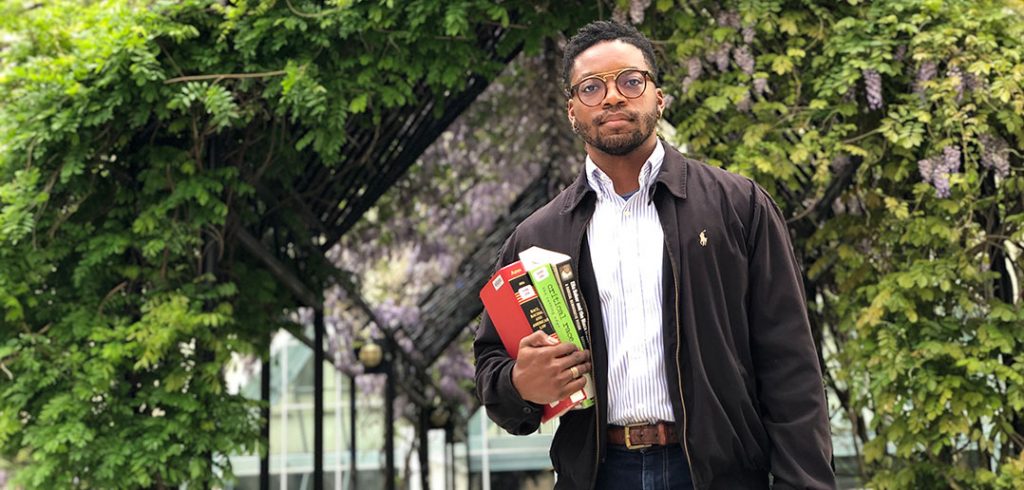By the time Darius Johnson enrolled as a Stein Scholar at Fordham’s School of Law in 2018, he was feeling very sure of his decision. The Mobile, Alabama, native was active in the pre-law group at Morehouse College, where he majored in English literature. In the summer of 2017, attended St. John’s University School of Law’s Ronald H. Brown Pre-Law Prep Program.
His arrival at Fordham Law brought some twists though. Intrigued by the progressive transformative justice policies going on at the Kings County District Attorney General’s office, he interned there the summer of 2019. But he became discouraged by the many repeat offenders cycling through the office in the short time he was there. He decided instead to intern remotely with the Center for Constitutional Rights, to learn more about international human and civil rights litigation. There he became interested in movement law.
“I gained so much exposure to different attorneys who were doing all kinds of work, not only at CCR, but across the nation and internationally, and I found that experience gave me some insight as to what the day-to-day work of a litigator who’s practicing movement lawyering would look like,” he said.
Movement lawyers support and advance social movements, both through traditional lawyer work in areas such as trials or housing, and through community events, like organizing free weekend classes for citizens to learn more about their rights under the law.
“The role of the movement lawyer isn’t a confined or restricted activity. It’s many different things, and it’s based on what the community needs and what the community is demanding. It’s another way of just simply empowering people,” said Johnson, who is one of Fordham Law’s Stein Scholars—a diverse group of law students committed to public interest law.
After his CCR internship, Johnson still felt a yearning to work directly with clients. Last fall, he began working with the Law School’s Family Advocacy Clinic.
“I had trepidations about doing only direct services work, because I care about institutional and systemic issues, but I realized there can be a balance of the two in various ways, and that’s where creativity comes into play,” he said.
His final internship, with the group Movement for Family Power, confirmed for him that empowering local communities is what he wants to do. This fall, he’ll join the staff of the Bronx Defenders as an entry-level attorney.
Johnson channeled that commitment to empowerment on campus as well; during his second year, he was president of the Black Students Law Association. The group helped the Law School craft a plan to address systematic racism within the college.
“I had a number of students who I worked alongside to try to make Fordham a better institution,” he said, singling out current and past students Christina John, Taylor Carter, Hema Lochan, Dana McBeth, Diana Imbert, and Leena Widdi.
“They’ve had a tremendous impact on my ability to develop and lead, as well as figure out my own path.”
Johnson acknowledged that completing his studies was difficult. As someone who didn’t know his father and had few male role models growing up, he said that the guidance of Professor Ian Weinstein, his Stein Scholar faculty mentor, helped him a great deal. Adjunct professor Kenneth Montgomery, whose trial advocacy class Johnson took, was also an inspiration.
“As a Black man, he showed me who I could become and how I could do it,” he said.
Johnson was raised by his mother and grandmother, who he said gave him “a sense of identity.” But it wasn’t always easy.
“I watched my mom struggle every day to make life bearable and enjoyable, and she did her absolute best. But I also saw throughout my own city that my reality was quite common. I witnessed a lot of the injustices that were happening, whether it was in the education system or the rampant homelessness or the hidden history of my city when it came to enslavement,” he said.
Literature played a part in Johnson’s developing identity as well, particularly Toni Morrison’s 1970 novel The Bluest Eye, which he read his senior year at Morehouse.
“It really put into perspective the ways in which Black youth are robbed of their innocence, and how that has a lingering effect throughout one’s lifetime.”
It was a different way of understanding how literature could be written, and how we can share our real-world experiences with others. That’s something that I try to bring into my legal work whenever possible.”
Leah Hill, a clinical professor of law who oversees the Family Advocacy Clinic, said Johnson displayed a sense of humility and commitment to lifelong learning that would serve him well. She noted that to be a successful movement lawyer, one needs to engage people of all walks of life respectfully. She saw that in Johnson when she first met him, and again at the clinic.
“He knew how to show compassion and empathy without being paternalizing or condescending, or pitying clients. He was just really a pleasure to work with, because I could see how deeply committed he was to social justice,” she said.

